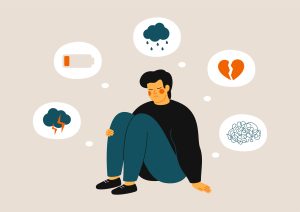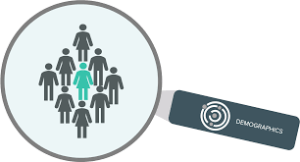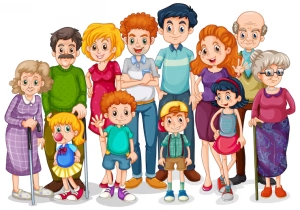Depression
Depression is a mood disorder characterized by persistent sadness, loss of interest in activities, and difficulty functioning in daily life. It’s more than just feeling down; it’s a serious condition with a range of symptoms that can affect thoughts, feelings, and behavior. While anyone can experience depression, it’s more common in women and can co-occur with other mental or physical health conditions.
Symptoms of Depression:
- Emotional: Persistent sadness, anxiety, irritability, feelings of worthlessness or guilt, loss of interest in previously enjoyable activities, and thoughts of death or suicide.
Physical:
Changes in sleep (insomnia or oversleeping), appetite changes (overeating or loss of appetite), fatigue, aches and pains, and digestive issues.
Cognitive:
Difficulty concentrating, remembering details, making decisions, and impaired cognitive function.
Behavioral:
Social withdrawal, decreased motivation, agitation, and restlessness.
Causes and Risk Factors:
- Biological Factors: Imbalances in brain chemicals like serotonin and dopamine, and genetic predisposition.
Psychological Factors: Stressful life events, trauma, and negative thought patterns. Environmental Factors: Social isolation, lack of support, and chronic illness can also contribute to depression.
Treatment:
- Medications: Antidepressants can help regulate brain chemistry.
Psychotherapy:
Talk therapy, such as cognitive behavioral therapy (CBT), can help individuals manage negative thoughts and develop coping strategies.
Combination:
A combination of medication and therapy is often the most effective approach.
Other options:
In severe cases, hospitalization or intensive outpatient programs may be necessary.
Coping Strategies:
- Stay connected: Maintain social connections and avoid isolation.
Engage in physical activity: Exercise can improve mood and energy levels. Practice healthy habits: Maintain a balanced diet, get enough sleep, and limit alcohol consumption. Seek support: Talk to a trusted friend, family member, or mental health professional.
Important Note: Depression is a treatable illness, and seeking help is a sign of strength. If you or someone you know is experiencing symptoms of depression, it’s crucial to reach out to a healthcare professional for diagnosis and treatment.































Post Comment